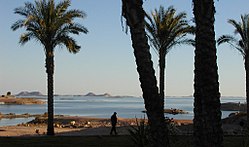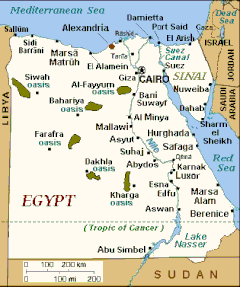Lake Nasser
| Lake Nasser | |
|---|---|

View from Abu Simbel
|
|

Map showing the location of the lake
|
|
| Coordinates | 22°25′N 31°45′E / 22.417°N 31.750°ECoordinates: 22°25′N 31°45′E / 22.417°N 31.750°E |
| Lake type | Reservoir |
| Primary inflows | Nile |
| Primary outflows | Nile |
| Basin countries | Egypt, Sudan |
| Max. length | 550 km (340 mi) |
| Max. width | 35 km (22 mi) |
| Surface area | 5,250 km2 (2,030 sq mi) |
| Average depth | 25.2 m (83 ft) |
| Max. depth | 180 m (590 ft) |
| Water volume | 132 km3 (32 cu mi) |
| Shore length1 | 7,844 km (25,735,000 ft) |
| Surface elevation | 183 m (600 ft) |
| 1 Shore length is not a well-defined measure. | |
Lake Nasser (Arabic: بحيرة ناصر Boħēret Nāṣer, Egyptian Arabic: [boˈħeːɾet ˈnɑːsˤeɾ]) is a vast reservoir in southern Egypt and northern Sudan. It is one of the largest man-made lakes in the world. Before construction, Sudan was against the building of Lake Nasser because it would encroach on land in the North, where the Nubian people lived. They would have to be resettled. In the end Sudan's land near the area of Lake Nasser was mostly flooded by the lake.
Strictly, "Lake Nasser" refers only to the much larger portion of the lake that is in Egyptian territory (83% of the total), with the Sudanese preferring to call their smaller body of water Lake Nubia (Egyptian Arabic: بحيرة النوبة Boħēret Nubeyya, [boˈħeːɾet nʊˈbejjæ]).
The lake is some 69 km (43 mi) long and 35 km (22 mi) across at its widest point, which is near the Tropic of Cancer. It covers a total surface area of 5,250 km2 (2,030 sq mi) and has a storage capacity of some 132 km3 (32 cu mi) of water.
The lake was created as a result of the construction of the Aswan High Dam across the waters of the Nile between 1958 and 1970. The lake is named after Gamal Abdel Nasser, one of the leaders of the Egyptian Revolution of 1952, and the second President of Egypt, who initiated the High Dam project. It was President Anwar Sadat who inaugurated the lake and dam in 1970.
...
Wikipedia
